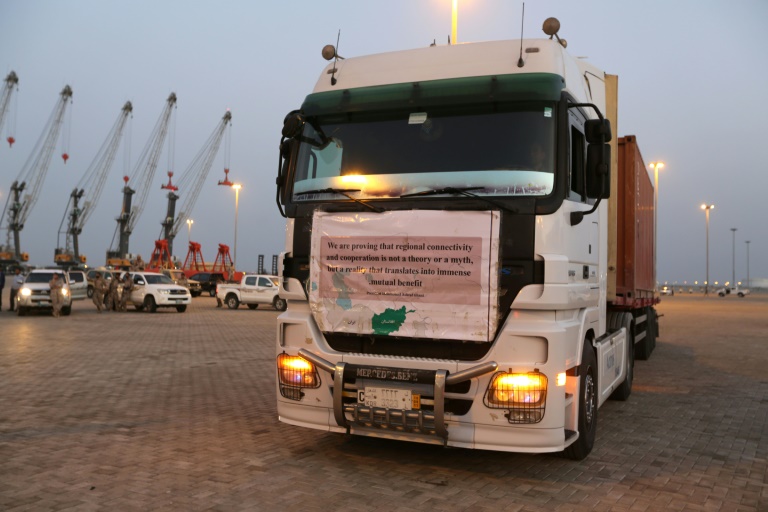US sanctions went into effect Monday on a major Indian port project in Iran, as President Donald Trump again showed his willingness to punish longstanding partner New Delhi in aid of his wider regional goals — in this case to pressure Tehran.
The sanctions on the Chabahar port come a day after wide UN sanctions also came back into force on Iran, as Trump, European allies and Israel have all targeted the country over its nuclear program.
The first Trump administration issued a rare exemption in 2018 to allow Indian companies to keep developing Chabahar when the United States imposed sweeping unilateral sanctions on Iran, whose main port at Bandar Abbas is overcapacity.
But much has changed since 2018. Kabul was then still controlled by a government backed by Washington, the European Union and India, who viewed Pakistan’s role in Afghanistan with suspicion, accusing it of having ties to the Taliban.
Chabahar had been billed as an alternate gateway to Afghanistan, bypassing Pakistan, which has long controlled the lion’s share of transit trade into Afghanistan.
The Taliban retook control of Afghanistan in 2021, as US forces withdrew under a peace deal signed by Trump.
The US president has also broken with decades of US deference to India, in which his predecessors declined to press New Delhi on disagreements as they saw the rising power as a counterweight to China.
Trump, who appeared peeved after Indian Prime Minister Narendra Modi declined to praise him over a ceasefire in a four-day conflict with Pakistan, has imposed major tariffs on India due to its purchases of oil from Russia.
State Department spokesman Tommy Pigott announced the end of the sanctions exemption on Chabahar in an earlier statement that said it was effective September 29.
The decision is “consistent with President Trump’s maximum pressure policy to isolate the Iranian regime” and the exemption had been made “for Afghanistan reconstruction assistance and economic development,” Pigott said.
– India weighs next move –
Under US law, companies including state-run India Ports Global Limited will have 45 days to exit Chabahar or risk having any US-based assets frozen and US transactions barred.
Joshua Kretman, a counsel at law firm Dentons who formerly worked on sanctions at the State Department, said any inclusion of an Indian firm on the sanctioned list “has the potential to create a kind of cascading effect where banks and other companies may not transact with the designated business.”
“If that sanctioned entity operates globally, needs access to major banks or dollar clearing, there is legitimate reason for concern,” he said.
Commenting on the decision, Indian foreign ministry spokesman Randhir Jaiswal said only: “We are presently examining the implications that this revocation has for India.”
Despite the closing of Afghanistan, India last year signed a 10-year contract in which the state-run India Ports Global Limited (IPGL) promised $370 million of investment in Chabahar.
The port remains strategic for India as it lies near the border with longtime adversary Pakistan, in the troubled Baluchistan region.
Barely 200 kilometers (125 miles) away on the Pakistani side, China is building a major port in Gwadar, which will give Beijing major new access into the Arabian Sea and Indian Ocean.
Chabahar “has strategic value for India: regional connectivity with Iran and Afghanistan and the Middle East without being held back” by “friction with Pakistan,” said Aparna Pande, a research fellow at the Hudson Institute.
But India is always careful not to violate sanctions, she said.
“At a time when there is an American administration which is imposing sanctions and tariffs as punitive action, India will likely adopt a wait-and-watch approach,” she said.
India begrudgingly stopped buying Iranian oil after Trump imposed sanctions in his first term.
Nonetheless Kadira Pethiyagoda, a geopolitical strategist who has written on Indian foreign policy, said that India could use Iran ties as “leverage in its dealings with the US, Gulf states and Israel.”
“India may choose to wear the sanctions as part of a broader effort amongst non-Western Great Powers, including China and Russia, to reduce reliance on the US economy and decouple from Western-controlled financial networks,” he said.
sct/aha

